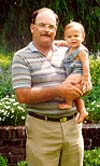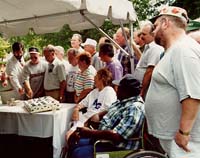 Larry
Wiggins and his grandchild.
Larry
Wiggins and his grandchild. Heart transplant program marks 10th anniversary
 Dr.
Jack Crumbley, left, celebrates with some of his heart transplant patients.
Photo by Stephanie Austin.
Dr.
Jack Crumbley, left, celebrates with some of his heart transplant patients.
Photo by Stephanie Austin.
On July 23, the 10th anniversary of the MUSC heart transplant program was commemorated with a party on the horseshoe. Celebrating along with members of the transplant team were many of their patients who are still alive because of their successful heart transplants at MUSC.
Each recipient was presented with a gold heart from Dr. Jack Crumbley, chief of the thoracic organ transplantation service, who performed the first MUSC heart transplant 10 years ago.
As of the date of the anniversary celebration, the service had performed 145 heart transplant operations. The programās success has been consistently higher than that of the average of all other transplant programs. One year post-transplant MUSCās survival rate is 89.9 percent, and the other centersā rate is 78.7 percent; five years post-transplant, MUSCās survival rate is 79.6, and the other centersā average is 63.3 percent; and nine years post-transplant, MUSCās survival rate is 67.8 percent, and the other centersā rate is 45.9 percent.
But MUSCās success transcends the numbers, the real success can be seen in the recipients who are living productive and fulfilling lives. Several of them shared their thoughts on the day of the anniversary celebration.
 Larry
Wiggins and his grandchild.
Larry
Wiggins and his grandchild.
Larry Wiggins had his transplant in October 1994. Since that time he said he was able to see his youngest daughter graduate from high school and experience the joy of his first and only grandchild. ćYou know,ä said Wiggins, ćjust things like that make you glad youāre still here.ä John Magee, one of the most recent transplant patients, was able to share in the joy in the birth of a niece and attend a brotherās wedding. But most important to Magee was reaching his 40th birthday. ćI never thought I would be able to make it to be 40 years old,ä he said.
Darlene Furtick, who received a heart and lung at MUSC late in 1994, said she can do whatever she wants to do now. Before her transplant she could barely walk, relying on a wheelchair. In 1996, she joined other transplant patients in walking the Cooper River Bridge, and a week later they walked four miles in the March of Dimes walk.
Furtick believes the success of MUSCās transplant program is the staff. ćThe doctors Iāve had, I love each of them,ä she said. They have a special place in my heart. They are people doctors.
ćItās like one of my doctors told me, ĪIt doesnāt matter how much you try not to get involved, or how much you try to keep your distance, you always end up caring more than you should.ā I think thatās what makes them the kind of doctors they are.ä She said they take the time to talk to you and really care.